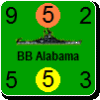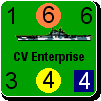rkr1958
Posts: 23483
Joined: 5/21/2009
Status: offline

|
Turn 24. Jul/Aug 1943. Destroyed & Repair Pools.
Turn 24 marks the 2/3 point of my planned 36 turn global war scenario. As you can see from the attached screen cap the carnage started last turn with the German "surprise" invasion of the Soviet Union continued. And like last turn, not all the carnage was on the Eastern Front. A good bit was in the Med, Atlantic and in Japan and her surrounding seas.
I wish to go off script here for just a bit to give you a few lessons that I've learned, or relearned, playing and posting this AAR. Please feel free to contribute either generically or as critique of my play.
1. It's scary how accurately MWiF simulates WW-2 at a strategic level. Not necessarily in the sense of the historical timeline like the BBC/PBS series "World at War", which would become boring very fast. But in the sense of how one can play out the strategic elements and the game results make sense from the "possibilities" of the time. What I'm trying to say is is that this game isn't "Risk" but that at a corps and fleet level, the military results from the game make sense given the "political" decisions made by the player(s). Now where one and all could argue at length is whether or not a leader or leaders of a given country, or countries, would make such political decisions. But, for me, that's the fun of this game and, in my opinion, gives this game infinite replayability. In reality I know replayability is not infinite, but is finite; however, I believe the number of interesting, and more importantly entertaining, MWiF game combinations is so large that one could not get through them all in a single lifetime, which for me is essentially infinite. OK, now I'm going to get to more specific lessons learned.
2. This game isn't "Risk" so if you do something strategically stupid then you're going to get punished for it.
3. Large scale amphibious invasions require naval and air supremacy, not just superiority.
4. The Med is a dangerous place for the Western Allies while the Italians are still in the game, unless you've achieved lesson 3.
5. Even supposedly "superior" fleets with "inadequate" air cover are vulnerable to "inferior" fleets with good air cover. A lesson the RN kept learning in the early years of the war especially off the coast of Norway, Greece / Crete and Malaya.
6. Weather complicates. Even the best planned operation can be thwarted because of weather.
7. The Western Allies must always be vigilant in the protection of their convoy lines. Even then, at times that's not enough. Also, running convoys through the Med when Italy is still in the game is a risky business.
8. A healthy wartime economy is a must. So, protection that economy is a top priority. Conversely, attacking that economy (e.g., subs, strategic bombing) can help bring an adversary to its knees.
9. Oil is everything. Without it, ships, planes and tanks don't run and a country's military collapses. Like 8, ensuring a healthy flow and stockpile of oil is also a top priority. Disrupting the enemy's flow or stockpile is an important tool in defeating them.
10. Air and naval are force multipliers. Air and naval superiority are musts to win a war.

 Attachment (1) Attachment (1)
< Message edited by rkr1958 -- 12/5/2015 3:44:06 PM >
_____________________________
Ronnie
|
 Printable Version
Printable Version

































 New Messages
New Messages No New Messages
No New Messages Hot Topic w/ New Messages
Hot Topic w/ New Messages Hot Topic w/o New Messages
Hot Topic w/o New Messages Locked w/ New Messages
Locked w/ New Messages Locked w/o New Messages
Locked w/o New Messages Post New Thread
Post New Thread